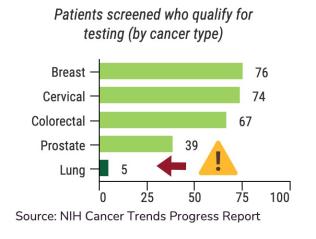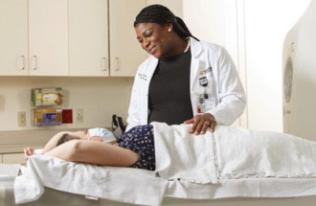Get screened!
See the information below for the best screening option for you.
Screening is the process of looking for cancer before any symptoms appear. When cancers are found early, before they have spread to other parts of the body, they are often easier to treat and have better outcomes.
Early detection is important
The cure rate of lung cancer detected in its early stages is greater than 80 percent. Though the benefits of early screening are well known, most people eligible and entitled to an annual lung screening computed tomography (CT) scan are not tested.
As shown in the graph to the right, according to the National Institute of Health Cancer Trends Progress Report in 2019, only 5 percent of eligible patients were screened for lung cancer. Eligible patients were screened at much higher rates for breast (76%), cervical (74%), colorectal (67%) and prostate cancer (39%).
Each year more people lose their lives to lung cancer than all of these forms of cancer combined. These losses are because, most of the time, lung cancer is found too late and has spread. Early, routine screening saves lives.
Does insurance cover lung cancer screening?
Almost all insurance programs, including Medicare, provide coverage for lung cancer screening for those who meet the requirements. Check with your specific health plan to find out if you have coverage. If you need help paying for this test, please get in touch with our Patient Financial Services office.
Who is eligible for insurance-covered screening?
How to calculate pack years?
To calculate pack years, multiply the number of years you smoked by how many packs of cigarettes you smoked per day. For more information, visit the Smoking Pack-Years Calculator website.
For reference, 20 cigarettes are in 1 pack, and if you use loose tobacco, 1 ounce of loose rolled tobacco equals 2.5 packs.
If you or a loved one answers yes to all of the questions below, you or they should consider screening for lung cancer:
- Are you between the ages of 50 to 80 years old?
- Do you currently smoke, or did you quit smoking in the last 15 years?
- Have you smoked 20 pack years or more? A pack year is a way to measure the amount a person has smoked over a long period of time. See the calculation in the panel to the right.
Currently, insurance coverage for lung cancer screening applies to those who smoke or have previously smoked tobacco cigarettes. Ask your healthcare provider to discuss whether further testing is needed if you have these other potential risk factors:
- Exposure to secondhand smoke, radon, asbestos, or other inhaled cancer-causing agents in the workplace
- Family history
- Smoked cigars or pipes
What is the screening process like?
The test is quick and easy. Using a low-dose computed tomography (LDCT) scanner, we take detailed pictures (or scans) of your lungs in under 2 minutes. The LDCT machine is open. Your head and feet stay outside the machine. A doctor examines these pictures to look for changes that could be signs of lung cancer.
There are no special preparations or precautions. The entire process usually takes less than 15 minutes.
It is essential to schedule an LDCT scan every year because new cancers can grow quickly, even after periods of slow growth.
What are the benefits and risks of early screening?
When it comes to cancer, the sooner healthcare providers spot it, the easier it is to treat. As with all medical procedures, there are benefits and some associated risks.
The benefits of diagnosing lung cancer early include:
- Lung cancer screening saves lives. Since lung cancer screening became available to people considered at high risk of lung cancer, more than 10,000 American lives have been saved.
- Treatment may be more successful. Research shows spotting lung cancer at the earliest stages improves the chances of survival. The National Lung Screening Trial (NLST) study found that 20 percent of patients were saved by having a lung cancer screening and 7 percent were saved from death of any cause.
- You may have more treatment choices. Patients with early-stage lung cancer often have choices of surgery, radiation, and chemotherapy. When lung cancer is more advanced, there are fewer treatment choices available. Late-stage lung cancer is often too advanced for surgery.
The risks of lung cancer screening include:
- False alarms. The scan might show something that looks like lung cancer but is not actually lung cancer. Approximately 1 in 5 people might have a false alarm, and most of them will have another scan to show they do not have cancer.
- Overdiagnosis. Sometimes slow-growing cancer that might not otherwise have been diagnosed but also might not lead to illness or death is found. Treatment for these cancers is called overdiagnosis and occurs in only 4 of 1000 people screened.
- Radiation. Like an X-ray, LDCT uses radiation, a type of energy that, if given in high doses or repeated exposure, can be harmful or cause cancer. Studies show the risk of radiation with LDCT is very low.
Who should I contact if I am interested in a lung screening CT scan?
Ask your healthcare provider to discuss your options or see if you qualify for a lung cancer screening that is covered by insurance. Contact the Lung Health and Pulmonary Nodule Clinic if you do not have a primary healthcare provider or have other questions. When you have an appointment scheduled at Dartmouth Hitchcock Medical Center (DHMC), you can learn about getting around DHMC and Dartmouth Cancer Center on our parking, transportation and maps page.
What if I need support to stop smoking?
Prevention means taking steps to lower your risk of developing certain types of lung cancer. At our Tobacco Treatment Program, we can help you quit the use of tobacco as one of these important steps.

